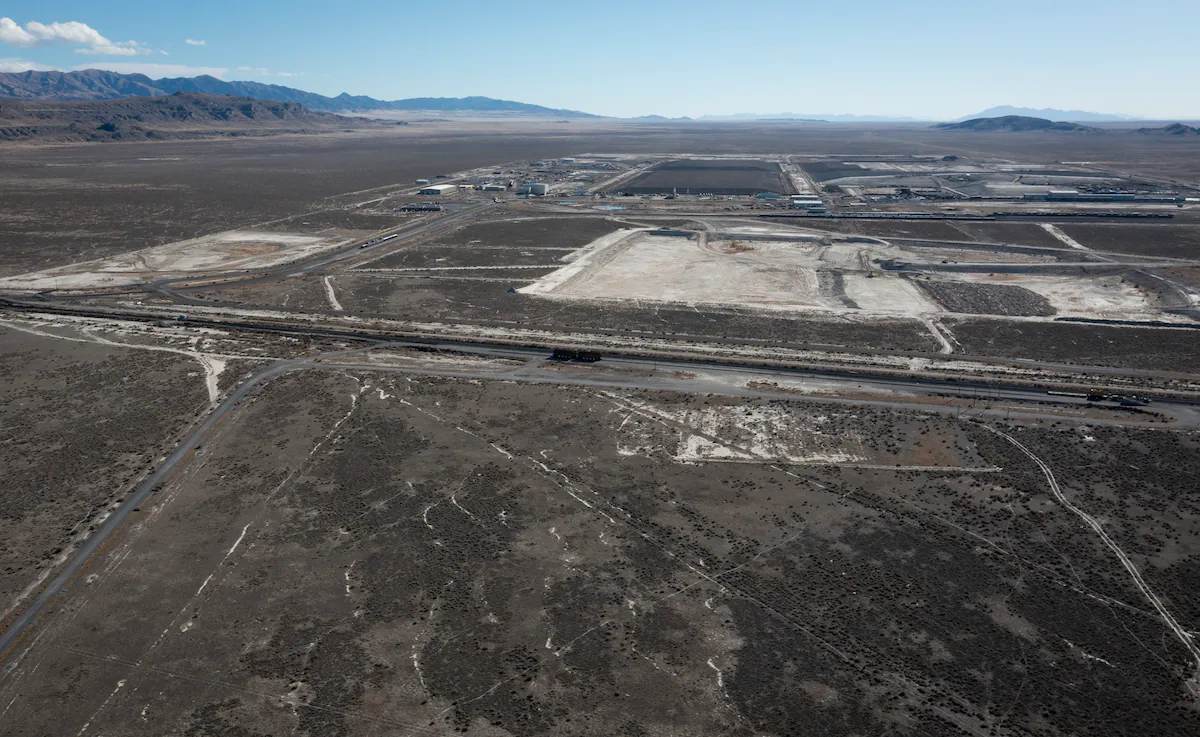Copyright Salt Lake Tribune

Note to readers • This story is made possible through a partnership between The Salt Lake Tribune and Grist, a nonprofit environmental media organization. A Utah company wants to import massive amounts of Canadian radioactive waste to a facility less than 100 miles from the state’s largest population center. EnergySolutions seeks to transport up to 1.3 million cubic yards of low-level radioactive and mixed waste — enough to fill roughly 400 Olympic-sized swimming pools — from Ontario, Canada, to its Clive facility in Tooele County, it confirmed in a statement Thursday. The international nuclear services company is headquartered in Salt Lake City. Its proposal, if approved, would mark the first time Utah allows foreign radioactive waste to be stored within state boundaries. The company currently accepts low-level radioactive and other hazardous waste from across the nation at the Clive site for burial, which opened in 1988. The request is under consideration by the Northwest Interstate Compact on Low-Level Radioactive Waste Management, which manages the disposal of such waste in Utah and seven other states. At least six states must approve the proposal, and Utah can veto it. EnergySolutions says it will ask Utah regulators for permission to expand its storage capacity to accept the waste from Canada and shipments from across the U.S. The company expects to pay $30 million under a new tax imposed by the state Legislature in order to generate money for Gov. Spencer Cox’s Operation Gigawatt — his initiative to double energy production in Utah over the next decade. “We have robust rules and regulations in place that minimize any risk to the public,” a spokesperson for the Utah Department of Environmental Quality wrote in an email. “Consistent with our mission statement, these guardrails allow for business growth and economic development while protecting Utah’s air, land, and water.” While the Ontario generators that create the waste lie beyond the nation’s northern border, an EnergySolutions representative noted, they produce power that serves communities in the United States. “The type of material being proposed for disposal is identical to the same low-level waste the facility has safely managed for more than thirty years,” the company wrote in a statement. “This initiative continues that long-standing partnership while. generating revenue for the state to advance safe, emission-free nuclear power.” What kind of radioactive waste could come to Utah? The Canadian radioactive waste that the company is looking to import is Class A, which are materials with the lowest levels of radioactivity, according to the U.S. Nuclear Regulatory Commission. Typical low-level radioactive materials include contaminated protective clothing, filters, cleaning rags, medical swabs and syringes, according to the NRC. However, a lobbyist for EnergySolutions told lawmakers this year, while discussing the proposed expansion, the waste could include components of decommissioned nuclear power plants. The Canadian shipments would also include mixed waste, which is any type of radioactive material that is combined with hazardous waste. The Clive facility currently holds Class A radioactive “soil, concrete rubble, demolition debris, large components and personal protective equipment,” a company spokesperson said. That waste comes from the federal government and domestic power plants. EnergySolutions will only accept foreign waste generated within the province of Ontario, it noted in a letter filed Sept. 9 seeking approval from the interstate compact. The materials cannot be shipped from other locations. No depleted uranium will travel from Canada to the landfill site, the company confirmed. This case would mark the first time a state in the compact accepts foreign radioactive waste, confirmed Kristen Schwab, executive director of the Northwest Interstate Compact. And only two states in the compact accept low-level radioactive waste for disposal at all — Utah and Washington. The waste from Ontario will travel to Clive via rail, the company said. Though, the exact route is not described in its letter to the compact. It will use rail routes it currently uses for domestic loads, the company said in its statement to The Tribune. “All such waste shipments,” it wrote in its statement, “will be made in compliance with applicable regulatory requirements.” HEAL Utah, an environmental watchdog, said it has concerns about potential spills along the route. “Historically, Utah residents have been concerned about waste coming through their communities to be dumped in our state,” said Carmen Valdez, a senior policy associate for the nonprofit. EnergySolutions previously sought to ship parts of a dismantled nuclear plant from Italy to its Utah location in 2008. The state vetoed the plan with the backing of then-Gov. Jon Huntsman, who bristled at the idea of storing radioactive materials from other countries. “As I have always emphatically declared,” Huntsman said at the time, “Utah should not be the world’s dumping ground.” Attitudes toward nuclear energy have shifted in recent years, as the nation’s demand for energy increases due to the rise of artificial intelligence, data centers and electric vehicles that place mounting demand on the grid. In April, the governors of Utah, Wyoming and Idaho signed a tri-state agreement to collaborate on energy policy and nuclear power development. Next steps In order to import the Canadian waste, EnergySolutions must get a license from the Nuclear Regulatory Commission and the Canadian Nuclear Safety Commission, the company confirmed. The company also needs approval from the Utah Department of Environmental Quality to move forward with its facility expansion. The company estimates will keep the Clive site operational for another 45 years. The Utah Legislature earlier this year passed Senate Bill 216, which streamlined the process for such expansions and added a new tax on facilities that plan to scale up. Revenue generated from that tax would go to the Utah Energy Research Fund. EnergySolutions said it would apply for the expansion by Dec. 31, and DEQ confirmed it has not yet received an application. The company wants compact officials to approve the Ontario deal ahead of that state process, EnergySolutions said in an Oct. 31 follow-up letter. Waiting until DEQ approves its expansion would cause delays, it said. One member of the compact committee suggested imposing a 10-year deadline for EnergySolutions to import the 1.3 million cubic yards of waste from Ontario to the Clive site. The company opposed the timeline, saying it would jeopardize its ability to “reasonably recover its investment,” including the $30 million expansion tax. The company proposed that the compact committee could instead re-evaluate the approval if EnergySolutions does not reach the waste volume limit within a decade after receiving its first load of Ontario waste, the company proposed. Shipments from Ontario will account for a fraction of the waste ultimately stored in the planned expansion, the company and DEQ said. The company’s plans call for an additional 8.6 million cubic yards of capacity, according to Oct. 9 minutes from a special meeting of the committee. About 85% of the expansion is meant for U.S. customers, the company noted in presentation materials. “Domestic capacity is a priority,” the DEQ spokesperson confirmed via email. “The EnergySolutions facility remains one of the most heavily regulated facilities in the country,” the DEQ spokesperson wrote, “and the State’s regulatory oversight remains effective to ensure the safe management of the nation’s low-level radioactive waste.” Environmental advocates at HEAL remain wary about importing waste from other countries. “We do have to find solutions to storing that waste safely,” Valdez said, “but we want to really ensure that we have enough means to manage the waste that already exists in the United States before we start accepting international waste at the benefit and profit of a private company.” Low-level radioactive waste generated in Utah — from facilities like medical labs or universities, for example — is not disposed of in the state. As a member of the compact, Utah sends its waste to a facility in Richland, Washington. The compact committee plans to discuss EnergySolutions’ proposal again at a meeting on Nov. 25.



